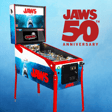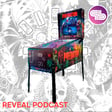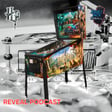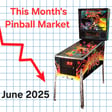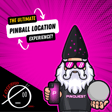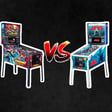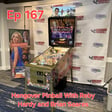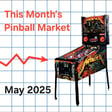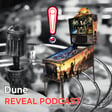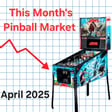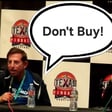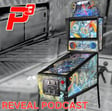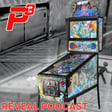Become a Creator today!Start creating today - Share your story with the world!
Start for free
00:00:00
00:00:01

Ep 161 Reinventing Pinball with Gerry Stellenberg
We have the owner and creator of the Multimorphic P3 and PRoc system on today's episode. We're talking about where the idea came from, is the system becoming outdated, and why does the module have a sticker on the playfield instead of painted on wood.
If you want that $1,000 discount, email us at loserkidpinballpodcast @gmail.com
You can find the P3 at multimorphic.com
Click here for all our social and merch links:
https://linktr.ee/loserkidpinball
Transcript
Introduction and Sponsorship
00:00:08
Speaker
Thanks for tuning into the loser kid pinball podcast.
00:00:10
Speaker
We are on episode one 61.
00:00:11
Speaker
I am excited.
00:00:14
Speaker
It is going to be a special episode.
00:00:15
Speaker
I am Josh Roop.
00:00:16
Speaker
You're your host along with me, my co-captain, uh, Scott Larson and Scott.
00:00:21
Speaker
There's plenty going on.
00:00:23
Speaker
And, uh,
00:00:25
Speaker
I know your favorite people in the world.
00:00:27
Speaker
Who are you going to be buying pinball from?
00:00:29
Speaker
Well, so Zach and Nicole, many have always helped me out and I just got some upgrades for some stuff.
00:00:33
Speaker
And the funny thing is I keep finding things that I need to add to my machines, such as even like toppers, armor, shaker motors.
00:00:43
Speaker
So if you need anything for your machines, Zach and Nicole have been able to help me out and we've really appreciated their service.
00:00:51
Speaker
and for their sponsorship of this podcast.
00:00:53
Speaker
And so reach out to them if you are looking for that pinball machine, new or used.
Multimorphic P3 Unboxing and Impressions
00:00:57
Speaker
Definitely.
00:00:58
Speaker
So if you've been following Loserkid over the last week or so, you've noticed that I have received an interesting machine into my house.
00:01:07
Speaker
I've done a first impressions and an unboxing of a multimorphic P3 system.
00:01:12
Speaker
And I've been able to get more hands-on to the system, which I've been super excited about.
00:01:17
Speaker
And I want to bring Jerry on the owner and creator of multimorphic P three system to pick his brain on some of the stuff we're seeing kind of some of the questions that the community has asked before and just kind of do a
Journey to a Modular Pinball System
00:01:30
Speaker
deep dive with you.
00:01:30
Speaker
So I appreciate you coming on Jerry to do this with us.
00:01:33
Speaker
Yeah.
00:01:34
Speaker
Awesome.
00:01:34
Speaker
Happy to be here.
00:01:35
Speaker
Thanks for having me.
00:01:36
Speaker
Definitely.
00:01:36
Speaker
Definitely.
00:01:38
Speaker
I mean, first off, where did this even come from?
00:01:40
Speaker
Like, I know that like in the past we've had kind of like, there was a,
00:01:45
Speaker
you know, pin, pin 2000 with, with Williams and whatnot.
00:01:49
Speaker
And then I can't think of, has there really any been any other concept outside of maybe just virtual, virtual, nothing, nothing that integrates to this level.
00:02:01
Speaker
What was the company that originally owned alien?
00:02:03
Speaker
They tried to do a modular system as well, but it didn't really work out with highway.
00:02:07
Speaker
Was it highway?
00:02:08
Speaker
I think so.
00:02:09
Speaker
But other than that, like there just really hasn't been this concept of video integrated with pinball in this way.
00:02:15
Speaker
What, what, what made you wake up one day and be like, you know what?
00:02:19
Speaker
I'm making this and this is now my life dream.
00:02:23
Speaker
The day was when I walked into my game room slash guest bedroom plus additional guest bedroom plus additional guest bedroom and found 13 pinball machines hanging out in my house.
00:02:37
Speaker
I'm like, why did I spend all this money?
00:02:39
Speaker
Why did I take up all these rooms?
00:02:41
Speaker
Why did I do all these things to scratch and itch the love for pinball that we all have?
00:02:47
Speaker
Why did I fill up my house to do this?
00:02:51
Speaker
When I have a Nintendo Wii that has tons of games, I have a phone that has tons of apps, I have a computer that has tons of apps, why are these devices, these really cool, mechanically complex things,
00:03:06
Speaker
Why are they the same thing every time I turn them on?
00:03:09
Speaker
So it seemed to me like a pinball machine should be able to run a lot of different applications, a lot of different game rules, but also when you get into that kind of level of, of gameplay variety, why can't we change the mechanics too?
00:03:25
Speaker
And so, so that was the, the basis of the idea.
00:03:28
Speaker
Um, then it went through a whole, a whole slew of, um,
00:03:33
Speaker
Technology needs, right?
00:03:34
Speaker
Control systems and mechanical setup and all that stuff.
00:03:37
Speaker
And I'm sure we'll get into that.
00:03:38
Speaker
But yeah, it started out just me, me realizing I was addicted beyond the means.
00:03:44
Speaker
And I didn't want my house to be that way.
00:03:47
Speaker
You're like, I'm at 13 machines.
00:03:48
Speaker
How can I double this with keeping the space I have?
00:03:51
Speaker
Exactly.
00:03:52
Speaker
You could have eight folded up in your garage like I do.
00:03:56
Speaker
Was it special when lit?
00:03:59
Speaker
Was that the documentary where they went to the guy's barn?
00:04:01
Speaker
Yeah, and he had so many of them.
00:04:05
Speaker
He kept building levels in there just out of plywood and stuff.
00:04:08
Speaker
You're like...
00:04:08
Speaker
that doesn't look safe.
00:04:09
Speaker
It looked like a house of cards.
00:04:11
Speaker
Yeah.
00:04:11
Speaker
Yeah.
00:04:13
Speaker
That documentary, which definitely featured the, uh, the more eclectic aspects of the hobby and the personalities.
00:04:19
Speaker
Yeah.
00:04:21
Speaker
So how long has, how long you've been doing multimorphic now?
00:04:26
Speaker
So we started as pinball controllers.com.
00:04:30
Speaker
Uh, that was a sole proprietorship that I started when I designed the P rock board.
00:04:35
Speaker
That was in 2009.
00:04:38
Speaker
2012 is when a friend and I designed the first P3 prototype machine.
00:04:44
Speaker
We incorporated later that year after TPF that year.
00:04:48
Speaker
And we started shipping machines, P3 machines in 2017.
00:04:51
Speaker
So we've been shipping seven and a half, eight years.
00:04:56
Speaker
Nice.
00:04:57
Speaker
Okay.
Financial Struggles and Support
00:05:00
Speaker
And well, actually, you're probably going to follow up on that question.
00:05:03
Speaker
I think I'm going to turn.
00:05:04
Speaker
So go ahead, Josh.
00:05:06
Speaker
Oh, I was just going to say, so how long did it go from concept to actual games outdoor?
00:05:16
Speaker
I started building, well, a friend and I in my garage in Austin, Texas started building the prototype.
00:05:22
Speaker
It was, I guess, late 2011.
00:05:23
Speaker
First prototype was 2011, finished in 2012, took it to TPF.
00:05:27
Speaker
We iterated...
00:05:32
Speaker
made another prototype 2013, made a third prototype in 2013, a fourth prototype in 2015.
00:05:41
Speaker
And then we brought on a mechanical engineer.
00:05:44
Speaker
Or maybe it was a year before, we brought on a mechanical engineer and actually designed what could be a production machine, iterated through the details of that for a couple of years.
00:05:53
Speaker
And then we took pre-orders,
00:05:57
Speaker
throughout that process.
00:06:01
Speaker
Uh, 2013, I think we took our first pre-order with the expectations that we'd ship in a year.
00:06:06
Speaker
And four years later, we had our first production machine out the door.
00:06:10
Speaker
So that is a, getting a company off the ground is always challenging because you, you have a combination of startup costs.
00:06:17
Speaker
You have a combination of, um, there's going to be a while to break even.
00:06:22
Speaker
And, uh,
00:06:24
Speaker
So how did you figure, so you are the owner of the company, is that correct?
00:06:28
Speaker
Yes.
00:06:29
Speaker
Okay.
00:06:29
Speaker
So, so how, how did you decide you want to take this plunge?
00:06:32
Speaker
I mean, that's a pretty, that's a big endeavor to say, Hey, I'm going to start a company and it's not just starting a pinball company there.
00:06:40
Speaker
You're starting a company that is pinball, but different.
00:06:44
Speaker
So lead me through that.
00:06:46
Speaker
Okay.
00:06:47
Speaker
So in 2009, when I created the PROC board,
00:06:53
Speaker
I also quit my day job to do not
Technological Relevance and Upgrades
00:06:57
Speaker
pinball stuff, to create a company.
00:07:01
Speaker
I feel like I have the entrepreneurial spirit.
00:07:03
Speaker
I didn't want to keep doing what the company I worked for kept wanting me to do.
00:07:08
Speaker
I had my own ideas.
00:07:09
Speaker
I wanted to pursue different things.
00:07:11
Speaker
I started, I started, I founded a company.
00:07:17
Speaker
went and started researching, not researching, I just went and started asking VCs for support, pitched the thing to dozens, maybe a hundred different possible investors.
00:07:30
Speaker
And through the process, learned that the idea I had was beyond the means of a newbie startup founder to do.
00:07:41
Speaker
No one was going to invest in me to do the idea I had because it was too big for a
00:07:46
Speaker
for a no-name beginner guy who didn't have a lot of experienced support.
00:07:51
Speaker
But while doing that, I was creating the PROT control system.
00:07:59
Speaker
I created the driver boards, the switch boards, all the things necessary to create a pinball machine.
00:08:06
Speaker
When I decided not to pursue the company that I was pursuing, that's when the friend and I just started tinkering around with this concept machine.
00:08:16
Speaker
The machine wasn't intended to be a company.
00:08:19
Speaker
It wasn't supposed to turn into this or that wasn't the intention.
00:08:22
Speaker
We just designed a machine because we could.
00:08:24
Speaker
I'm an engineer of electronics and computer engineering, so I'm pretty good with engineering electronics and software.
00:08:34
Speaker
He was very good with the mechanical aspects and we put this machine together for fun.
00:08:38
Speaker
Took it to TPF.
00:08:39
Speaker
People seemed to like it.
00:08:41
Speaker
Showed it to a relative who was in town and an aunt and uncle.
00:08:46
Speaker
And they were like, this is really cool.
00:08:49
Speaker
You said people really enjoyed it.
00:08:50
Speaker
Do you think you could sell it?
00:08:52
Speaker
Maybe this was right around the time Jersey Jack had announced Wizard of Oz.
00:08:58
Speaker
They were basically the second manufacturer that, that existed at the time they were in the,
00:09:04
Speaker
the early development stages and this is a different idea maybe it's something we could pursue but it's going to take a lot of money to do it and they said well we'll help we'll give you and they named a number that was an eighth of what i thought i would need to get it done an eighth i had a i had a
00:09:28
Speaker
An acquaintance who was a business advisor, and I went and talked to him.
00:09:31
Speaker
I was like, they want to give me some money to get this thing started, but it's nowhere near enough.
00:09:36
Speaker
Should I?
00:09:37
Speaker
What's your advice?
00:09:38
Speaker
And he said, if someone's offering you money, you take it and you give it a shot.
00:09:44
Speaker
And it was the worst advice I've ever received in my professional career because...
00:09:52
Speaker
My estimates were accurate and building a pinball machine is complex enough.
00:09:57
Speaker
Homebrewers know how expensive it is to build a single machine.
00:10:01
Speaker
Building a company and an infrastructure, manufacturing infrastructure, getting all the tools and the equipment and the training stuff and all the prototype materials and paying for all the parts and all that stuff over the year.
00:10:13
Speaker
It's a significant expense beyond what most people realize.
00:10:19
Speaker
And it was, it was pretty dumb to do that in the early days without, without enough money.
00:10:23
Speaker
So basically I worked for, I worked for 10 years with no paycheck.
00:10:27
Speaker
Some of the other guys working with us made and still make pretty big sacrifices because it's a, it's a, it's a cool thing.
00:10:36
Speaker
It's a passion thing.
00:10:36
Speaker
It's, it's a neat product that we all love to create, to develop.
00:10:41
Speaker
Yeah, it was pretty stupid.
00:10:42
Speaker
I went into it kind of
00:10:45
Speaker
without awareness of the challenges and the expenses that it would, that it would incur.
00:10:51
Speaker
So I know that the P rock board, so when did the P rock board get introduced at all of this?
00:10:56
Speaker
Cause I know you started selling it to like, I think spooky picked it up.
00:10:59
Speaker
American was using it.
00:11:00
Speaker
I'm trying to think there were, there was a handful of Dutch was using it.
00:11:04
Speaker
So was that helping some of the offset, some of the costs?
00:11:07
Speaker
Like how, how was that playing into things?
00:11:09
Speaker
Yes.
00:11:09
Speaker
So the P rock,
00:11:11
Speaker
Came out with the P-Rock in 2009.
00:11:13
Speaker
It was 2011 when Dutch Pinball picked it up.
00:11:16
Speaker
They built Bride of Pinball 2, which then they built the company around that, turned it into Big Lebowski.
00:11:23
Speaker
Some other people picked it up.
00:11:24
Speaker
Scott Denisey designed TNA with it after a different project with it.
00:11:31
Speaker
And Josh Kugler developed two machines, two homebrew machines.
00:11:38
Speaker
Keith Elwin developed Archer.
00:11:40
Speaker
These are people that started as homebrewers and went and got involved with companies.
00:11:46
Speaker
And most of those companies, because of the influence of those guys, adopted our control system as the control system for the machine.
00:11:54
Speaker
So Josh was our end to American Pinball.
00:11:57
Speaker
American Pinball basically started with Josh and the idea of the Houdini machine from way back.
00:12:03
Speaker
But Josh is like, yeah, I know the P-Rock, so let's get the P-Rock.
00:12:06
Speaker
Scott Denisi, P-Rock.
00:12:09
Speaker
who became a very good friend back in those early days.
00:12:12
Speaker
He told Charlie, who at the time needed a control system solution after a couple of their first games, they switched to P-Rock.
00:12:21
Speaker
Dutch pinball always was P-Rock.
00:12:23
Speaker
And yes, that brought in a good chunk of revenue that helped us pay for all those expenses I mentioned while we weren't bringing in revenue, while we weren't selling the machine yet.
00:12:36
Speaker
you still incur the costs.
00:12:38
Speaker
You still have to move forward and develop stuff and order parts and try things out.
00:12:42
Speaker
So yeah, that was a huge help.
00:12:45
Speaker
So one challenge that people have, and we see this with different iterations of games where they'll have, you know, you go through the, you know, the EM and then you go to the solid state and then you go to, you know, the system games, then you get to the DMD.
00:13:01
Speaker
And so
00:13:02
Speaker
Each system has an elevation and iteration that needs to constantly be upgraded.
00:13:09
Speaker
And it's easy when you're developing a one-off.
00:13:12
Speaker
Because if you're developing a system, then it's like, well, we'll do the next 10 games with this type of system.
00:13:19
Speaker
And then you can upgrade it.
00:13:20
Speaker
The one challenge I've always had with the P3 is...
00:13:26
Speaker
How are you able to plan for that for all of your development and to keep the system current while you're also saying, well, if we upgrade it, we also have to worry about backwards compatibility because you have all these modules that still have to function.
00:13:44
Speaker
And so can you walk me through that?
00:13:46
Speaker
Because that's always been a confusing part for me and the P3.
00:13:53
Speaker
So there's a couple things to unravel there, but there's the computer system, there's the control system, which is more interfacing to switches and drivers and things, and then there's the mechanical structure.
00:14:13
Speaker
The computer system of the first P3 prototype is more advanced than the most advanced
00:14:24
Speaker
pinball machine's computer system today other than the P3.
00:14:29
Speaker
Because we're driving a big LCD, we use an off-the-shelf Intel motherboard with a NVIDIA graphics card and substantial memory and a solid-state hard drive.
00:14:41
Speaker
Basically, we took a desktop computer because we're doing the things in the pinball machine that a desktop computer does and we put it in the pinball machine.
00:14:51
Speaker
So our
00:14:52
Speaker
computer system today, which has evolved because of availability.
00:14:55
Speaker
We can't buy the motherboards we first put in anymore.
00:14:58
Speaker
We can't buy the CPUs.
00:14:59
Speaker
So we've updated all of the technical components over the years, but it's still a computer and it still runs software.
00:15:07
Speaker
They're all running a version of Linux.
00:15:09
Speaker
The Linux kernel for the technical people has been updated throughout the process.
00:15:17
Speaker
The technology though is really the same and there's really no
00:15:22
Speaker
No limit to where that can go.
00:15:24
Speaker
Computers are going to continue getting faster.
00:15:27
Speaker
All the motherboard makers and the CPU makers are going to continue making new versions and end-of-lifing the old versions, and we'll just continue evolving there.
00:15:37
Speaker
There's the control system, the PROC board.
00:15:39
Speaker
We originally designed the PROC board as a plug-in for existing machines, WPC machines and CERN machines, so people could drop it in and write new rules for it.
00:15:49
Speaker
The board in the P3 is slightly different.
00:15:51
Speaker
It's a modified version of that that we call the P3 ROC.
00:15:55
Speaker
It's got a programmable chip on it, and it interfaces to a modular set of driver and switchboards.
00:16:03
Speaker
The PROC system in the P3, we developed it in 2012.
00:16:10
Speaker
It's three years after the original PROC.
00:16:12
Speaker
It is the most advanced control system still in pinball.
00:16:17
Speaker
The latest control
00:16:19
Speaker
control systems from all the other manufacturers, your Stern node board setup, your spike two, people are predicting spike three.
00:16:26
Speaker
Who knows what that's going to look like.
00:16:29
Speaker
All of the control systems from all the other manufacturers are slower and have fewer features than the P3 rock board that I designed in 2012.
00:16:38
Speaker
So there's, there's,
00:16:42
Speaker
There's an assumption that because our technology is similar to what it was 10 years ago, a little more than 10 years ago, that it's outdated, but that's entirely not true.
00:16:53
Speaker
It's actually still the most advanced in the industry.
00:16:57
Speaker
For the mechanical structure, yeah, that evolves over time as we come up with new features, but we're still using traditional switches, targets, rubber rings, drop targets.
00:17:08
Speaker
We purchase all those
00:17:10
Speaker
As many things as possible, we purchase those from existing pinball parts suppliers because we don't want to have to reinvent everything.
00:17:18
Speaker
And those things haven't changed in 30, 40, 50 years.
00:17:22
Speaker
So there's an assumption because we have a technological machine that it needs to keep moving forward.
00:17:28
Speaker
But relative to what?
00:17:29
Speaker
Because relative to pinball, it's by far the most advanced system that existed 12 years ago, and it still is today.
00:17:40
Speaker
we've created a number of upgrades over the course of the years.
00:17:43
Speaker
We started with a back box that had a translate in it.
00:17:50
Speaker
It just had a flat translate that you could change out when you swapped your game.
00:17:53
Speaker
You would change the image in the back box, and that's it.
00:17:56
Speaker
And we came out with an LCD, so we replaced the translate with an LCD.
00:18:01
Speaker
We offered that as an upgrade kit to everyone who had already
00:18:04
Speaker
owned a P3 with the Translite.
00:18:08
Speaker
The machine behind Josh there shows a very cool backlit speaker panel with Princess Bride artwork.
00:18:17
Speaker
The early versions of the P3 didn't.
00:18:19
Speaker
They were a flat, black, solid speaker panel with a P3 logo in it.
00:18:27
Speaker
And I decided
P3's Multi-Game Capability and Customer Satisfaction
00:18:28
Speaker
one day that in a lineup of modern machines, it didn't look as
00:18:34
Speaker
as eye-catching as some of the other machines out there.
00:18:36
Speaker
So we added this artwork piece and we recently released an upgrade kit for all P3 owners, including the very first one who bought a machine years ago.
00:18:46
Speaker
And we allow them, we help them, we have instructions to swap out their back box components to be able to show all these new features.
00:18:56
Speaker
The speakers now have RGB LEDs in them.
00:18:59
Speaker
All P3 owners who get this back box upgrade can enjoy those.
00:19:04
Speaker
There's things inside the game.
00:19:05
Speaker
The wall and scoop assembly used to be a coil-driven thing.
00:19:09
Speaker
Now it's a motor-driven thing.
00:19:12
Speaker
Functionally, it's the same way.
00:19:14
Speaker
Functionally, it works the same way, right?
00:19:17
Speaker
The scoop or the wall pops up, and that's all it really needs to do.
00:19:20
Speaker
If we need to add more logic or more interesting functionality to that, we'll make it available as an upgrade to existing owners.
00:19:28
Speaker
I can't promise we'll always make everything available to all previous owners at some point
00:19:33
Speaker
That doesn't work.
00:19:35
Speaker
But there's really no other product in any other industry that lets you avoid buying the new model of it and keep updating the old model.
00:19:45
Speaker
You buy a car or whatever or a computer and you're choosing the new technology over your old technology.
00:19:54
Speaker
Whatever features are in cars these days, you can't really retrofit them into old ones.
00:19:59
Speaker
So I feel pretty good that we've supported our customers over the years.
00:20:03
Speaker
We've given them all the upgrades we've added to the new machines and we support them like no other.
00:20:10
Speaker
And this is a question, this is an interesting question because you can't ask this to any other manufacturer.
00:20:15
Speaker
It's irrelevant.
00:20:15
Speaker
They, as you said, come out with a new single themed machine that totally replaces or gets added to a lineup of older machines.
00:20:24
Speaker
Yeah.
00:20:26
Speaker
So I want to shift back to one of the things we were talking about earlier, just for a second.
00:20:30
Speaker
We were talking about the P-Rock and how that was making a good chunk of the income for multi-morphic those in those early days.
00:20:38
Speaker
But as time has moved on, a lot of these companies like Spooky and American and whatnot have come out with their own proprietary boards.
00:20:47
Speaker
Has it affected the bottom line of Multimorphic?
00:20:50
Speaker
Or is it one of those things that Multimorphic's profitable enough that it was great getting you guys off the ground, but right now you guys are like a bicycle, you're up on your wheels, and so it doesn't really matter anymore?
00:21:00
Speaker
I'm not asking for specific numbers, just trying to kind of get an idea of where it
00:21:05
Speaker
you guys land on this yeah the the last thing you said is is the most accurate so the the p rock sales to existing manufacturers supplemented our ability to build the prototypes to get off the ground to get to production um it took a couple years in production before we ramped up our volume enough to where the incoming revenue um
00:21:30
Speaker
which of course it needs to offset the costs of building the thing.
00:21:35
Speaker
You need a profit in order to be able to support the future development costs.
00:21:41
Speaker
It took a couple of years before we got close to what I would say was cashflow positive.
00:21:48
Speaker
Cashflow positive meaning
00:21:50
Speaker
enough money is coming in to offset the money we're spending.
00:21:54
Speaker
Discounts, the past money spent, debt, and all those things.
00:21:58
Speaker
Cash flow positive comes before profitability.
00:22:03
Speaker
When the P-Rock sales to certain companies started falling off, it was kind of pretty well-timed with
00:22:16
Speaker
Weird Al coming out, Heist and Weird Al coming out.
00:22:19
Speaker
Heist came out in 2020, right when COVID hit, actually.
00:22:25
Speaker
And Weird Al was two years later.
00:22:27
Speaker
And those machines kind of took us from slight growth to significant growth.
00:22:31
Speaker
And that brought in enough revenue to more than make up for the lost revenue from a couple of manufacturers developing their own systems and designing out the P-ROG.
00:22:43
Speaker
Okay, so you did pull out the cash flow positive.
00:22:46
Speaker
Are you in the profitability stage?
00:22:48
Speaker
So every game is different.
00:22:50
Speaker
We've had good games that are great sellers for us, and we've had other games that haven't sold as much.
00:22:58
Speaker
We're in an okay place right now.
00:23:00
Speaker
We're making enough money with each game sale to justify continuing to build the next one and hopefully more than one after it.
00:23:06
Speaker
So it's a tough business, though.
00:23:08
Speaker
There's no illusion about it.
00:23:11
Speaker
Every single manufacturer is probably one or two duds from a big problem.
00:23:18
Speaker
And the industry is soft right now as well.
00:23:20
Speaker
So we're all kind of trying to maneuver through this difficult industry.
00:23:24
Speaker
And there are so many companies right now, we're all kind of competing for a lot of the same dollars.
00:23:29
Speaker
It's a tough business, but yes, we are justifying the time and effort and money we're putting into it based on how many sales we're getting, which is all we could really ask for.
00:23:41
Speaker
Can we ask roughly how many is going out the door?
00:23:45
Speaker
We don't need solid numbers.
00:23:46
Speaker
Yeah, it's a weird question with the P3.
00:23:48
Speaker
It's a weird question, right?
00:23:50
Speaker
Because every other manufacturer, it's not a weird question, but it's a different comparison because every other manufacturer comes out with a new game and they have to sell some number of that new machine, 700 of these, or someone needs to sell all 2,000 of their run in order to
00:24:09
Speaker
justify their business.
00:24:11
Speaker
We come out with a new game for the P3 and it's possible it moves zero P3 cabinets.
00:24:18
Speaker
Maybe it only sells to existing P3 owners.
00:24:22
Speaker
Or on the flip side, maybe it's a theme that appeals to a ton of people that aren't yet in the pinball community or aren't people that own P3s and it sells mostly new machines.
00:24:32
Speaker
So every game is different.
00:24:35
Speaker
I'm not going to answer your question directly.
00:24:37
Speaker
It's kind of
00:24:38
Speaker
That's fine.
00:24:39
Speaker
Delicate information.
00:24:40
Speaker
Sure.
00:24:40
Speaker
Yeah, that's fair.
00:24:41
Speaker
But every P3 customer that we have might never buy a P3 again.
00:24:47
Speaker
They already have it.
00:24:49
Speaker
So they're customers for future game kits, and that's enough.
00:24:54
Speaker
If we only sell game kits moving forward, if we never move another machine, our business can be justified because we have enough of those customers who might buy machines.
00:25:03
Speaker
Interestingly, though, over the last year or so,
00:25:07
Speaker
We've had a lot of people add a second P3 to their lineup, which is really cool because now that we have eight play field modules, I mean, a lot of them are like, I really want their favorite Princess Bride.
00:25:18
Speaker
I really want Weird Al in a machine all the time.
00:25:21
Speaker
I'm looking behind you, Scott, and I see your lineup of games, right?
00:25:25
Speaker
Some people just want a game that they can turn it on and play that instantly.
00:25:28
Speaker
And maybe they use the other cabinet for swapping games.
00:25:30
Speaker
So we were justified if nobody buys another new P3,
00:25:36
Speaker
If people buy more P3s, then obviously it's better for us too.
00:25:41
Speaker
Well, there are people like, I have three Switches.
00:25:44
Speaker
My kids lost one of them, but I have three of them.
00:25:47
Speaker
One of them's in the ether somewhere.
00:25:48
Speaker
So that does make sense.
00:25:51
Speaker
Which game has been your biggest seller?
00:25:54
Speaker
So Weird Al sold the most cabinets.
00:25:59
Speaker
Ever since then, every successive release has sold more game kits than the last.
00:26:06
Speaker
which makes sense because every game kit brings on some number of new machine buyers and the customer base continues to grow.
00:26:15
Speaker
So it's a difficult question to give you a clear answer.
00:26:19
Speaker
Weird Al made us the most money, if that's what you're asking.
00:26:23
Speaker
Well, I guess it's just more of like, let's just assume that I'm interested in X game module.
00:26:31
Speaker
Which one has the most out there?
00:26:34
Speaker
Is it weird?
00:26:34
Speaker
Game module?
00:26:36
Speaker
Uh, no.
00:26:38
Speaker
Okay.
00:26:38
Speaker
It's princess bride.
00:26:41
Speaker
Okay.
00:26:41
Speaker
Okay.
00:26:44
Speaker
I think that speaks to, cause you're saying that.
00:26:45
Speaker
So like where'd I'll sell the most cabinets, but each game was successfully had sold more than the previous one.
00:26:51
Speaker
So that's cool because like with Scott Denise's final resistance, that means that like even, uh,
00:26:57
Speaker
an original theme in pinball, which usually don't do very great, has was successful on a certain level with you guys, which translates very well, in my opinion, that's very cool for something like that.
00:27:11
Speaker
Because everyone who has a P3 bought it, knowing that the value of ownership increases every time they add a game kit to it.
00:27:19
Speaker
So everyone's always looking at our next title thinking they're going to get it.
00:27:23
Speaker
So we really have to turn somebody off to,
00:27:26
Speaker
for them not to buy the next game.
00:27:27
Speaker
And, and obviously we're amazing at our jobs and create really cool stuff.
00:27:31
Speaker
So we, we don't generally turn people off.
00:27:33
Speaker
Well, and, and not like you're tooting your own horn.
00:27:36
Speaker
I think you should, because one thing I'm being facetious of course, I'm actually not, not tooting.
00:27:43
Speaker
We get a lot of criticism and a lot of hate in the world.
00:27:45
Speaker
And, and, and, but we, we also have a great customer base that loves the machine and loves what we do.
00:27:52
Speaker
And that that's why we build these games.
00:27:54
Speaker
Well, and one thing that I've always been a big advocate of is software and code, and it has to fill right.
00:28:02
Speaker
And, you know, this is one thing I kind of point out in the first impressions video, but you can tell this is coded by someone that knows pinball, that knows what risk reward does and how to make, you know,
00:28:17
Speaker
with Princess Bride, for example, you know, as you wish, you even get to decide if you want to bring that multi ball in and there's a risk to bringing that multi ball in.
00:28:25
Speaker
Same with like some multi balls aren't allowed during certain modes.
00:28:29
Speaker
It just, it's, the thing is, is, is other competitors will sometimes give you all the fixings on the plate.
00:28:38
Speaker
And, and some of the best designers have learned.
00:28:41
Speaker
It's not everything that you give a person, it's how you give it to them.
00:28:45
Speaker
And,
00:28:46
Speaker
and be able to know that fine balance, right?
00:28:50
Speaker
And I can tell with Colin McAlpine working on the rules and stuff with this, he's very much done that.
00:28:55
Speaker
And honestly, code wise, I'm enjoying both these and Weird Al and Princess Bride are really, really coded very, very well.
00:29:04
Speaker
And I just have to tip my hat to you on that because I think that's one thing too, is people can complain like, well, if I get a game in my house,
00:29:12
Speaker
And you get the honeymoon phase, right?
00:29:13
Speaker
And you love it and everything.
00:29:15
Speaker
But if the code's not really there, then six months to a year down the road, it becomes this like, do I really want to keep it in my house?
00:29:23
Speaker
It's not what I was expecting.
00:29:24
Speaker
Do I want to see where the direction goes?
00:29:27
Speaker
But it seems like you guys have got it figured out with how to code these because I'm not getting bored with the gameplay.
00:29:34
Speaker
Granted, I've had it for a week.
00:29:35
Speaker
So I guess we could ask in six months.
00:29:38
Speaker
But...
00:29:39
Speaker
Overall, I guess worst case scenario, if I get bored with that, I just pull out the module and put another module in.
00:29:43
Speaker
That's the thing.
00:29:44
Speaker
It stays fresh over time, and you're not likely to burn yourself out on one thing if you have multiple game kits.
00:29:49
Speaker
But thank you for that.
00:29:52
Speaker
Weird Al.
00:29:54
Speaker
Weird Al, we were mostly through the development before we brought Colin and Bo and Karen's on board at the same time, right at the end of the Weird Al development.
00:30:06
Speaker
So that complement extends beyond...
00:30:09
Speaker
beyond our rules experts to the full development team.
00:30:11
Speaker
We sit in meetings and design these rule sets as a team for months and months and months.
00:30:19
Speaker
For Final Resistance, which was we brought Bowen on for the rules of that game.
00:30:25
Speaker
It wasn't just Bowen off in a room creating rules.
00:30:28
Speaker
It was Bowen proposing a lot of ideas, but also everyone else proposing a bunch of ideas and Bowen kind of sifting through some of the ideas and presenting
00:30:37
Speaker
cohesive package and then us all reviewing it and we don't like this but we love this and let's try to change this and that mode is a little too similar to one we put in the last game let's change it it's it's a group effort but you're right that people like colin and bowen and people with a lot of rules experience because they know they're encyclopedic about their rules knowledge they know what
00:31:03
Speaker
is interesting for both beginners and for expert level players.
00:31:09
Speaker
So one question I do have, and I I've talked to Josh a little offline.
00:31:12
Speaker
So right now the game is at Josh's place, which is three hours away.
00:31:16
Speaker
So I'm planning on making a journey out there so I can experience it too.
00:31:22
Speaker
Okay.
00:31:22
Speaker
One question I think I have, and many people have when you're removing the module,
00:31:29
Speaker
and you're putting a different one in, here's my concern.
00:31:33
Speaker
And I've talked offline with Josh on this a little bit.
00:31:38
Speaker
So first off, when you have people who get into pinball, you have the people who only know how to turn it on, right?
00:31:48
Speaker
And then you get to the next level, the people who have actually pulled off the glass.
00:31:55
Speaker
And then you get to the next level of people who can, okay, I can maintain the top part of the game, maybe like do some stuff.
00:32:04
Speaker
Then you get to the next level of people who can get under the cabinet.
00:32:07
Speaker
Okay.
00:32:08
Speaker
It seems like replacing a module is kind of at that level.
00:32:12
Speaker
Someone who's at least familiar or comfortable enough with taking the glass off, taking a module out, putting another module in.
00:32:20
Speaker
And I'm wondering how you overcome that because there's a lot of people who,
00:32:24
Speaker
in pinball who are not to that level of being able to to set to be you know mechanically savvy enough to remove and insert a new module into a game and i bet that's a big barrier to entry for your for your module for your game um i guess your business model it certainly can be now i mean a lot of people bought weird al
00:32:49
Speaker
Because they were Weird Al fans and wanted one machine.
Customer Support and Community
00:32:53
Speaker
And then they learned through watching my emails or getting involved in the community that, oh, this is a multi-game system and I can enjoy more things on this machine.
00:33:05
Speaker
Therefore, I'm now a pinhead and I want to learn how to do these kind of things.
00:33:12
Speaker
But yeah.
00:33:13
Speaker
I mean, some people, I guess I'm thinking about support.
00:33:19
Speaker
when people call us for help, some people call us to your point with, I don't know, I need to adjust to this thing.
00:33:29
Speaker
I shoot the ball around the orbit and it comes out and it goes straight down the middle or whatever.
00:33:34
Speaker
We're like, okay, this is a beginner.
00:33:36
Speaker
They don't know that they can pull the glass and they can just kind of maneuver that rail to give themselves the better path.
00:33:42
Speaker
So we talk them through that.
00:33:43
Speaker
And we get other people who are like,
00:33:47
Speaker
having an issue with a drop target.
00:33:48
Speaker
I've tested the coil.
00:33:49
Speaker
It measures such and such ohms, and I've traced it all the way back to the driver board, and those people know what they're doing.
00:33:57
Speaker
We have customers that span the entire range of experience, and we have a great support staff that helps them.
00:34:06
Speaker
It hasn't really seemed like a barrier to entry, possibly because
00:34:12
Speaker
Most people don't really think about the complexity of it when they buy the machine.
00:34:18
Speaker
When you buy a Nintendo, you just, right, you get it.
00:34:21
Speaker
You get a cartridge, you slide it in.
00:34:22
Speaker
Yeah, yeah.
00:34:23
Speaker
Whatever.
00:34:23
Speaker
So a multi-game pinball thing, it must be whatever.
00:34:28
Speaker
When we send a machine out to somebody, we send an email, give them expectations about the process, but also say, this machine is different from a traditional pinball machine.
00:34:41
Speaker
has a different way to control it.
00:34:45
Speaker
We have a different menu system than others.
00:34:47
Speaker
It's also a multi-game system.
00:34:49
Speaker
And here is a link to a full resource, a full web page with resources for helping you understand what you're doing.
00:34:59
Speaker
You might be able to get away with just reading the usage and maintenance sections, or if you need to get into troubleshooting, there's guides there too.
00:35:07
Speaker
I don't know.
00:35:08
Speaker
I don't really know what to say other than everybody's different.
00:35:14
Speaker
And we as a company have to have the support and information for the full range of experiences.
00:35:22
Speaker
And we seem to do a pretty good job because...
00:35:28
Speaker
Unless someone just gives up on a tough thing or gets frustrated and sells the machine, we've been able to walk every single customer through any fix necessary for their machine.
00:35:40
Speaker
With one exception or one type of exception, which is where it doesn't make sense for them to go any deeper.
00:35:47
Speaker
And we're just like, well, send us the flipper assembly back or send us the game module back and we'll just address it here.
00:35:52
Speaker
Because it'll take us two weeks to walk you through the details of debugging something.
00:35:58
Speaker
Well, and I didn't even know this, but so I've been trying to go from the perspective of if I was a first time buyer getting this in my house, not, and I, I do apologize.
00:36:06
Speaker
I did.
00:36:07
Speaker
I got to the part where it said this is more, or this is different from traditional pinball.
00:36:12
Speaker
The first thing went off in my head was like, well, duh.
00:36:14
Speaker
Like, so I didn't read that part.
00:36:16
Speaker
I know, I know what I'm getting into, but I should have read that part.
00:36:19
Speaker
But yeah, you on multimorphia.
00:36:21
Speaker
So Josh, the person who, who said on the video that we sent out this really great introductory email is,
00:36:27
Speaker
We learned later on in his video that he didn't even read half of it.
00:36:30
Speaker
I read most of it.
00:36:33
Speaker
Well done, Josh.
00:36:34
Speaker
Well, I got to the part where it said, this is different than any other system.
00:36:38
Speaker
Like obvious, like, okay.
00:36:42
Speaker
So you're a stereotypical dude right now.
00:36:44
Speaker
You're like, I don't need to read the instructions.
00:36:46
Speaker
I got this.
00:36:47
Speaker
It gets better.
00:36:47
Speaker
Okay.
00:36:48
Speaker
I went to go switch out.
00:36:49
Speaker
Cause I wanted to get the experience kind of like, you know, as the, as the common customer, I guess.
00:36:54
Speaker
And so we went to go switch out Weird Al and switch out Princess Bride into Weird Al.
00:37:00
Speaker
I was telling Jerry this today, and I was like, I got frustrated because I didn't know what to do because I looked at the instructions, skimmed and went, yeah, I think I can figure this out.
00:37:10
Speaker
Stuck it down.
00:37:12
Speaker
I went to go switch it out.
00:37:13
Speaker
And why am I having such a hard time doing this?
00:37:15
Speaker
And I realized, oh, it says right here in the instructions, take all the balls out before you try to put the next module in.
00:37:19
Speaker
Oh, I should probably try to do that.
00:37:21
Speaker
But you guys have done, like, it's a big piece of cardboard.
00:37:25
Speaker
As soon as you open the module, it's like, here are the instructions.
00:37:28
Speaker
Like, you guys have done that in a way.
00:37:30
Speaker
And not only that, so I released the video for the unboxing and the first impressions.
00:37:34
Speaker
And all of a sudden I got bombarded.
00:37:36
Speaker
I didn't realize you have a small army back there either.
00:37:38
Speaker
I got people, are you joining the discord?
00:37:41
Speaker
You know, have you done this?
00:37:42
Speaker
Like there's so many people enthusiastic about this.
00:37:45
Speaker
There's a very positive community that's behind multimorphic and they are willing to help you through it as well.
00:37:51
Speaker
So that would be my, one of my recommendations is that I've learned is if you're concerned about usability, if you're a friendliness, you know,
00:38:02
Speaker
Don't worry too much because there's a whole community almost any hour of the day, it seems like, willing to help you out if you're having an issue.
00:38:09
Speaker
And I feel like there's some other traditional pinball companies don't have even that kind of support of a community behind them.
00:38:16
Speaker
So that's one thing I just wanted to point out to say kudos to you guys because…
00:38:21
Speaker
It is impressive.
00:38:21
Speaker
And it's funny because like from the outside looking in before we've been doing this experiment, I was always just like, oh, it's a bunch of fanboys.
00:38:28
Speaker
They're just excited for this product.
00:38:30
Speaker
Right.
00:38:30
Speaker
But when you're in, when you're in the ecosystem of P3 and you're nervous about the product, but you've got all these people willing to help you, it makes it feel more comfortable.
00:38:41
Speaker
It makes it, it's easier to, to, to work with.
00:38:44
Speaker
And it takes that anxiety level way down.
00:38:46
Speaker
Right.
00:38:47
Speaker
So yeah.
00:38:48
Speaker
And that's something that's grown over time based on feedback, right?
00:38:52
Speaker
We didn't always have that insert in the boxes.
00:38:55
Speaker
We used to just ship a play field out and people would get it.
00:38:58
Speaker
And some number of people would have issues with it.
00:39:00
Speaker
I installed it in my P3 and the launchers weren't aligned, but they didn't know the launchers weren't aligned.
00:39:05
Speaker
They just knew I put it in the P3 and it's not working.
00:39:09
Speaker
It's not launching balls.
00:39:10
Speaker
So we would, we would debug the issue with them.
00:39:14
Speaker
We would walk them through the steps to figure out what was going on and fix it.
00:39:17
Speaker
And then we're like,
00:39:18
Speaker
We've gotten enough support calls for this problem.
00:39:22
Speaker
How do we avoid or minimize the number of the same call?
00:39:26
Speaker
Let's create an instruction thing that you're forced to see as you open up the box.
00:39:31
Speaker
You see it.
00:39:32
Speaker
It's in the way.
00:39:32
Speaker
You have to set it aside in order to get the module out.
00:39:35
Speaker
Hopefully some percentage of people will read that and realize, oh, okay, if I put this module in, there may be a couple of, there's, so basically with,
00:39:46
Speaker
With any mechanical system, things have to be aligned properly.
00:39:49
Speaker
And you make a machine.
00:39:52
Speaker
And if you make one machine, things are aligned this way.
00:39:55
Speaker
And if you make another machine, they might be a millimeter off in the other direction because someone tightened a screw down while pushing this way or tightened a screw down while pushing this way.
00:40:03
Speaker
It's called tolerances.
00:40:05
Speaker
You might get a new play field, plug it in, and it doesn't quite line up to the position of your up kickers.
00:40:12
Speaker
Well, we provide very simple adjustments
00:40:16
Speaker
we call them adjustment screws for that.
00:40:18
Speaker
You go in the back of the play field, you turn a nut to tighten up the interface.
00:40:23
Speaker
It pushes the tubes forward and magically starts working.
00:40:27
Speaker
You may have to do it.
00:40:28
Speaker
You might not.
00:40:29
Speaker
It's a mechanical thing and they're all slightly different from each other.
00:40:33
Speaker
But we now include that instruction so that people aren't freaked out when they plug it in and it doesn't work.
00:40:39
Speaker
And that's an example.
00:40:40
Speaker
There's 40 different examples of things that we've
00:40:45
Speaker
improved over time to help people avoid the frustration that happens when they just don't understand how the thing works.
Modular Design and Gameplay Experience
00:40:53
Speaker
And yes, it's traditional pinball.
00:40:56
Speaker
Yes, it's got driver boards and switchboards and FET circuits like any game has.
00:41:02
Speaker
It's got a CPU that runs the code.
00:41:05
Speaker
But the mechanical setup is a bit different, and it intimidates people.
00:41:09
Speaker
So we've worked hard to get there.
00:41:11
Speaker
I appreciate you recognizing that, Josh.
00:41:15
Speaker
Now, how do you, one of the challenges with the P3 is all the mechanical parts are mostly in the back third, right?
00:41:27
Speaker
And so you're dealing with swapping that out.
00:41:29
Speaker
However, how do you incorporate, I know most pinball machines have most of the shots generally in the back there, but there's an encroachment that comes down depending on the game and it surrounds it.
00:41:42
Speaker
I mean, you look at Godzilla, you look at those types of games where-
00:41:46
Speaker
Yeah, there are things that are closer at you.
00:41:49
Speaker
So how do you prevent the trap of every game feeling similar to the other one?
00:41:56
Speaker
Because most of the things are in the back play field.
00:41:58
Speaker
How can you bring the action closer to the flippers?
00:42:03
Speaker
So to the first statement, let me just contradict it a little bit.
00:42:09
Speaker
Because everything's in the back third field.
00:42:13
Speaker
everything seems like they're in the back third above the play field.
00:42:16
Speaker
Okay.
00:42:17
Speaker
Below the play field, there are these huge mechanisms for the walls and scoops that pop up.
00:42:22
Speaker
And in front of that, there's the big LCD.
00:42:25
Speaker
Above those things in the lower portion, there's the hanging flipper assembly and side target assembly.
00:42:30
Speaker
So mechanically it's pretty rich throughout.
00:42:34
Speaker
It just presents a little bit differently than a traditional thing, machine.
00:42:39
Speaker
Before I answer your question directly, okay.
00:42:42
Speaker
The screen, the open area that people see when they look at a P3, that screen is the magic.
00:42:50
Speaker
That's the best part of the machine, in my opinion, of course, because that screen delivers so much more story immersion.
00:42:59
Speaker
It gives you the dynamic artwork, the dynamic reasoning for hitting a shot.
00:43:04
Speaker
Why am I shooting this orbit?
00:43:05
Speaker
I'm shooting this orbit because a blinking arrow is, an arrow is blinking,
00:43:10
Speaker
Or am I shooting this orbit because there's stuff in the scene that is pushing me in that direction and giving me a thematic reason to do that?
00:43:20
Speaker
We tell the story of the game through the LCD.
00:43:23
Speaker
And we also add virtual targets.
00:43:26
Speaker
There might be moving targets.
00:43:27
Speaker
There might be virtual rollover targets on the screen.
00:43:31
Speaker
We add a lot of interactivity to that empty area.
00:43:36
Speaker
So I say we've replaced the
00:43:40
Speaker
painted piece of wood that has a few pixels of LEDs on them with this fully immersive dynamic experience.
00:43:47
Speaker
We've, we took, instead of having 40 switches and a few LEDs on a play field, we have 2 million rollover RGB lit rollovers, which is, um, me joking, of course, but the LCD has a lot of pixels and everyone can be semi-interactive because we can put virtual targets there.
00:44:08
Speaker
Uh,
00:44:09
Speaker
Now, the direct answer to your question that I avoided for a long time.
00:44:13
Speaker
The flipper assembly is a floating assembly.
00:44:16
Speaker
This is a thing that slides in the front of the machine.
00:44:19
Speaker
The flippers hang down from a piece of clear polycarbonate.
00:44:24
Speaker
It's got slingshots.
00:44:26
Speaker
It's got flippers.
00:44:27
Speaker
Above those are the side target assemblies that do the same thing.
00:44:30
Speaker
They hang down from the sides.
00:44:32
Speaker
If you actually...
00:44:34
Speaker
pull the play field frame into service position, open up, we have a hinged front door to the play field structure, and look down underneath the flipper assembly, the side target assembly, there's an air gap to the LCD and there's nothing in there.
00:44:50
Speaker
It's a complete air gap.
00:44:51
Speaker
And we do that because we have infrared light shining across the play field surface, which is how we track the position of the ball.
00:44:58
Speaker
But the point is we have hanging side targets, we have hanging flippers,
00:45:03
Speaker
Heist has a crane mechanism that starts in the back and extends out over the play field.
00:45:09
Speaker
You can't see me on the camera, but it extends over the play field.
00:45:13
Speaker
It presents a hanging, moving target that gives you things to shoot for lower in the play field.
00:45:21
Speaker
We so far, I think we've successfully created...
00:45:27
Speaker
eight fully different gaming experiences in what most people call the back third of the play field.
00:45:35
Speaker
I don't think many people are going to say Princess Bride feels like Weird Al, feels like Lexi Lightspeed, feels like drained or third party developed drained or any of those things.
00:45:46
Speaker
However, if the theme ever calls for something lower in the play field,
00:45:52
Speaker
We're not going to do it just to tick a box off of a checklist.
00:45:56
Speaker
We're going to do it because the theme speaks to us and says, this is the time you need to hang some more things.
00:46:04
Speaker
We need, I don't know, an upwards drop target or something, or we need a scoop to catch the ball or whatever it is.
00:46:13
Speaker
We can do it.
00:46:14
Speaker
We can hang it over the play field surface.
00:46:16
Speaker
We have to engineer it a little differently than the traditional mechanism.
00:46:20
Speaker
Um, but it won't be long before you start to see mechanical things in the, in the, in the middle area of our play fields because, um, some things want it.
00:46:33
Speaker
So I've got a couple of questions now that I've had this in my house for a week now.
00:46:38
Speaker
One thing that I have noticed at like expo and TPF and stuff like that, um, is the upper play field does have a sticker versus the traditional printed on wood.
00:46:49
Speaker
Um, what is the long-term viability of the sticker and have you had any issues with it peeling or anything like that?
00:46:56
Speaker
Okay.
00:46:57
Speaker
So we started, um,
00:46:59
Speaker
First Playfield Lexi Lightspeed started shipping in 2017.
00:47:06
Speaker
We put on a sticker is the informal word for a vinyl decal with a laminate on top of it.
00:47:17
Speaker
So it's printed artwork on a sticker.
00:47:20
Speaker
And it has a protective layer called a laminate, a protective layer of clear plastic on top of it.
00:47:28
Speaker
just a weak thing that the ball is gonna destroy as soon as it rolls over it.
00:47:35
Speaker
However, it's not a clear code and it's not as durable and thick as a clear code.
00:47:40
Speaker
And people that put, well, we kept that same process through Weird Al, I think.
00:47:52
Speaker
And people that put Weird Al on location and got 6,000, 7,000, 8,000 plays in the course of a year, they started to see the ball wearing through certain spots where there was a scoop.
00:48:05
Speaker
So the good news is for those people, it's not clear-coded.
00:48:09
Speaker
So when they tear down the play field to clean it, like most good pinball collectors do, they
00:48:18
Speaker
We can send them a new decal and they can replace it and they can have basically a fresh play field after reinstalling everything.
00:48:26
Speaker
That's a good thing.
00:48:27
Speaker
But after Weird Al, based on that experience, we upgraded to a 10 mil, 10 thousandths of an inch, 10 mil thick laminate, which we've put million cycle tests through them and not seen a lick of wear.
00:48:46
Speaker
We have vertical upkick tests that bring the ball up and just drop it onto the playfield surface, and they're not wearing at all.
00:48:53
Speaker
So again, over time, we've learned from earlier decisions.
00:48:57
Speaker
Our current playfields, Princess Bride, previous playfield, I think we did on Final Resistance, have the 10 mil laminate, which are fully
00:49:10
Speaker
I mean, they'll wear eventually.
00:49:12
Speaker
Clear coat will wear eventually.
00:49:13
Speaker
They dimple and do other things and will wear eventually.
00:49:16
Speaker
But they're pretty solid.
00:49:18
Speaker
We don't expect to get any feedback of worn playfields with the Princess Bride.
00:49:25
Speaker
Do they peel?
00:49:26
Speaker
They peel if they're assembled poorly, meaning if the playfield surface wasn't properly cleaned,
00:49:35
Speaker
cleaned, it had dust on it or some kind of debris on it when you apply the decal.
00:49:42
Speaker
Or if the decal isn't properly pressed to the play field, it might not be adhering properly and you could see some peel.
00:49:50
Speaker
But when that happens, we made a mistake and we get the play field back and we do it right the second time and send it back to a customer.
00:49:58
Speaker
It's pretty rare that that's happened.
00:50:00
Speaker
It actually happened very
00:50:03
Speaker
seldomly on original play fields.
00:50:05
Speaker
The new material, the thicker material actually requires an enhanced process to get it on there solidly.
00:50:10
Speaker
But like everything else, it's part of the process.
00:50:13
Speaker
You look at clear coated play fields and you'll see a ton of drama out in the industry about the quality of the clear coat and the pulling and the chipping and all the other things.
00:50:21
Speaker
We don't have that problem because if something happens with your decal, like I said, you just, we can unassemble your play field, put a new one on there and you're good to go.
00:50:30
Speaker
And honestly, that only takes a few hours.
00:50:32
Speaker
Well, and you know, I just, it just dawned on me while you're saying this, you know, one of the other things too is a traditional pinball.
00:50:39
Speaker
If that does happen and the person doesn't feel confident in fixating it and they don't want to like, and it's in a place that you can't just stick a washer over it.
00:50:48
Speaker
You know, you don't want someone to send you just a blank play field and say, go for it.
00:50:53
Speaker
I mean, absolute worst case scenario with your stuff.
00:50:56
Speaker
I can pull out a module in five minutes if that.
00:50:58
Speaker
stick it in a box and ship it to you guys and let you take care of it.
00:51:02
Speaker
And, and I'm not gonna, it's funny.
00:51:05
Speaker
Cause it's like, well, and then best, like, even then it's like, well, I have another module.
00:51:08
Speaker
I'll just stick it in the game.
00:51:09
Speaker
We'll play that while, while princess bride is off to multiple more multimorphic, I guess I'd never thought of that.
00:51:15
Speaker
And so just dawned on me right now.
00:51:17
Speaker
That's actually, it's actually kind of cool.
00:51:20
Speaker
Yeah, we do that.
00:51:21
Speaker
We we've, we've done that a few times as someone has a strange mechanical issue that we simply,
00:51:27
Speaker
We can't walk them through.
00:51:28
Speaker
We can't get enough information over the phone or a video call to help them debug it, and we just ask them to ship it back.
00:51:34
Speaker
Stick it in the box, we'll send you a label and get it back here.
00:51:37
Speaker
Flipper assembly.
00:51:38
Speaker
The flipper assembly just slides out of the machine.
00:51:40
Speaker
Someone recently had a very strange problem we've never seen before, and we weren't sure if it was a power problem in their machine, in the wall, in their room, in their location.
00:51:49
Speaker
whatever, we actually sent them a new, a new everything.
00:51:52
Speaker
We sent them new cable harnesses, new flipper assembly, new power supply, new everything.
00:51:56
Speaker
We're like, I don't know what it is, but we're sending you everything.
00:52:01
Speaker
He's on location, by the way.
00:52:02
Speaker
So we're sending you everything.
00:52:04
Speaker
So you don't have to take your machine down for, for three weeks and send everything to us.
00:52:07
Speaker
We're sending you everything, swap in the components until the problem goes away and then send us back whatever the source of the problem was.
00:52:15
Speaker
And then we can debug it ourselves.
00:52:17
Speaker
He did that.
00:52:18
Speaker
And,
00:52:19
Speaker
You mean, Josh, it's not the same as like sending you a play field and saying you have to repopulate it?
00:52:25
Speaker
Yeah, exactly.
00:52:26
Speaker
That's exactly what I'm saying.
00:52:28
Speaker
Can you imagine?
00:52:30
Speaker
Yeah.
00:52:31
Speaker
But to Scott's point earlier, I mean, if that's what you're telling your new to pinball customer, I mean, it's like... Good luck.
00:52:40
Speaker
You might as well send a technician out to do it for me because... Yeah.
00:52:44
Speaker
But with us, yeah, just stick it in the box, send it to us.
00:52:46
Speaker
We'll take care of it.
00:52:46
Speaker
We'll send it back.
00:52:47
Speaker
You just plop it back in and you're good to go.
00:52:49
Speaker
Have you ever had a problem with the LCD screen considering there's a steel ball that's ricocheting off everything inside there?
00:52:57
Speaker
Any damage to that?
00:53:01
Speaker
No, because we didn't have, we knew we couldn't have a ball smashing around an LCD.
00:53:07
Speaker
There's actually a quarter inch thick piece of polycarbonate above the playfield LCD.
00:53:14
Speaker
So the ball is rolling on.
00:53:16
Speaker
Polycarbonate, by the way, is
00:53:18
Speaker
is one of the major ingredients in bulletproof glass.
00:53:21
Speaker
Um, it's, it's very durable.
00:53:22
Speaker
It's a, it's a very durable plastic.
00:53:24
Speaker
It's kind of scratch resistant.
00:53:26
Speaker
It doesn't shatter or crack.
00:53:28
Speaker
It will crack stress fractures and things, but, um, it's super durable and it's easy to clean with plastic polish.
00:53:35
Speaker
So, um, it's also super easy to remove from the machine.
00:53:39
Speaker
So when you fold down that front door, I told you about the flipper assembly can slide out, but also the play field surface, the,
00:53:44
Speaker
rectangular piece of polycarb that the ball rolls on, you can literally just slide it out the front of the machine.
00:53:49
Speaker
So if it gets scratched or overly dirty and you can't clean it off with, with some simple plastic polish, you just, you just swap it and put a new one in there.
00:53:57
Speaker
It takes 10 seconds.
00:54:00
Speaker
So, so one of my gripes, and I know that I've already talked to you about this, but I want to know the T the, the MDF, why do you guys do MDF instead of actually just routing out some, some channels and putting some T molding in for your corners and stuff?
00:54:14
Speaker
So we don't use MDF for edges or corners.
00:54:19
Speaker
What we do, so the cabinet sides are half-inch plywood.
00:54:24
Speaker
Okay.
00:54:26
Speaker
Nice, good Baltic birch plywood.
00:54:28
Speaker
Traditional machines are three-quarter inch.
00:54:31
Speaker
We use half-inch plywood, and then we use a quarter-inch piece of trim that we send around the outside edges of the
00:54:42
Speaker
side and that frames the artwork.
00:54:45
Speaker
So that quarter inch piece of trim is an MDF material.
00:54:49
Speaker
It's just about two inches worth of material that goes all the way around the outside of the side of the cabin.
00:54:56
Speaker
It's just a, you know, it's a cost slash easy to work with kind of trade-off.
00:55:02
Speaker
And I know on the body, it's not a big deal because it's kind of protected by the plywood and it's protected by the metal of the trim and stuff like that.
00:55:08
Speaker
But on the head, that's like what your corners are up on the very top corner.
00:55:11
Speaker
I see what you're saying.
00:55:12
Speaker
Yeah.
00:55:13
Speaker
So that was only my, because like a traditional pinball machine, a newer one has, you know, T molding around the edges and stuff like that.
00:55:20
Speaker
I see.
00:55:20
Speaker
Yeah.
00:55:20
Speaker
I thought you were talking about the lower cabinet, but on the back boxes, that was fine on the lower cabinet.
00:55:24
Speaker
I don't even notice on the lower cabinet.
00:55:25
Speaker
Yeah.
00:55:27
Speaker
You know what?
00:55:28
Speaker
In our history of eight years of shipping these machines, you're the first person ever to comment on the material in the back box.
00:55:36
Speaker
Okay.
00:55:38
Speaker
You're also the only person, the first person who got this $15,000 machine set up with two games on it and ran it into their wall as soon as the unboxed it.
00:55:47
Speaker
Yeah.
00:55:48
Speaker
Well, you know me.
00:55:49
Speaker
I was testing durability.
00:55:52
Speaker
Strong work there, Josh.
00:55:54
Speaker
Just so you know, that was Josh who damaged that.
00:55:57
Speaker
It was not Scott.
00:56:01
Speaker
Actually, speaking of that, when you have these game modules, two things that I would be afraid of by owning the game.
00:56:10
Speaker
One, what happens if I'm taking a game module out and I drop it?
00:56:17
Speaker
So that that's one thing too.
00:56:20
Speaker
How do you store these?
00:56:21
Speaker
Uh, because if you have, I, I would say, yes, you have the box that it was shipped out in, but I would say, you know, if you have like, you know, a, we, or a switch or something like that, there's, there's like a cartridge, uh,
00:56:36
Speaker
cover that you put it in.
00:56:37
Speaker
So is there anything available like that to like, Hey, I'm going to take this out and I'm going to store it in a nice looking box or do I have a cardboard box underneath my game?
00:56:48
Speaker
So first question was what happens if you drop it?
00:56:52
Speaker
Don't drop it.
00:56:53
Speaker
It is a three to $4,000 thing you're picking up.
00:56:58
Speaker
So you're probably likely to be pretty careful with it.
00:57:01
Speaker
But of course, if it, if it, we, we,
00:57:04
Speaker
So a little inside story.
00:57:08
Speaker
We built the first prototype of one of our games.
00:57:15
Speaker
We got it ready for our photo shoot, our video shoot, so we could build the trailer.
00:57:21
Speaker
And it fell off a table and landed upside down on the floor the day before the video shoot.
00:57:30
Speaker
And this is our only copy of
00:57:33
Speaker
the play field.
00:57:34
Speaker
So it was a mad rush to replace the cracked plastics and, and to get it looking presentable again for the video shoot.
00:57:41
Speaker
Anyway, it's yeah, there's, there's stuff on, there's lots of stuff.
00:57:46
Speaker
The reason it's $3,700 or $3,500 is because there's a huge number of mechs and plastics and metal rails and everything else.
00:57:55
Speaker
And they can get bent or dinged or broken.
00:57:58
Speaker
If you, if you mishandle them, it is safe to set the play fields on their side or on their back.
00:58:04
Speaker
It's obviously better to put it in the protective casing or the foams that we include in the boxes.
00:58:11
Speaker
The boxes are reasonable storage places, storage containers for play fields.
00:58:17
Speaker
They're sized to fit right under the machine.
00:58:21
Speaker
So most people with a lot of modules will store a couple under their machine and then put others in the closets or
00:58:29
Speaker
hide them away where they're not in the way.
00:58:32
Speaker
We don't currently offer a pretty cabinet kind of storage setup.
00:58:38
Speaker
People have shared plans for building a pullable cart that you can slide under the machine that can have a couple of play fields in it.
00:58:48
Speaker
We've tinkered around with those ideas.
00:58:50
Speaker
There's a third party, aep3shop.com, who sells a
00:58:55
Speaker
cabinet quality, really pretty storage, stackable storage container for P3 modules.
00:59:03
Speaker
We may start selling something like that someday.
00:59:07
Speaker
There seems to be a pretty good level of interest in pretty cabinet quality storage for these things.
00:59:14
Speaker
And yeah, we don't offer anything yet.
00:59:17
Speaker
People mostly use their shipping boxes, but it's something that we would like to
00:59:21
Speaker
to make prettier something.
00:59:23
Speaker
Just give them a sticker, a decal sticker, and they're just going to wrap around the box so it looks pretty underneath the game.
00:59:28
Speaker
That's funny because one of our customers did exactly that.
00:59:31
Speaker
They sent us pictures.
00:59:32
Speaker
They're like, I bought a decal and I wrapped my box with it.
00:59:35
Speaker
Now it looks like a cool crate instead of a cardboard box.
00:59:38
Speaker
Hey, I'm just helping you out here.
00:59:39
Speaker
That's a cool idea.
00:59:40
Speaker
Well, there is that deep root company that went out of business.
00:59:43
Speaker
Oh, my gosh.
00:59:43
Speaker
You can go buy some pin pods from them.
00:59:46
Speaker
Pin pods for your play fields.
00:59:49
Speaker
And the thing is, everything is a cost trade-off, right?
00:59:51
Speaker
We want our play fields to be very inexpensive, to not be perceived as an expensive purchase that defeats the purpose of owning a multi-game system.
01:00:01
Speaker
So you add a lot of expense to the shipping.
01:00:06
Speaker
Do you want your money in the play field features or in the shipping box?
01:00:09
Speaker
That's true, too.
01:00:09
Speaker
Well, it could be.
01:00:11
Speaker
Seriously, like these toppers that I'm buying and putting on machines, they're selling their...
01:00:16
Speaker
They're not cheap.
01:00:18
Speaker
And so I guarantee in the pinball community, if you offer it as an additional option, it's not required.
01:00:25
Speaker
but I guarantee you're going to have people who want to
Challenges in the Pinball Industry
01:00:28
Speaker
buy it.
01:00:28
Speaker
Yeah.
01:00:28
Speaker
Yeah.
01:00:28
Speaker
It's a cool idea.
01:00:30
Speaker
I like it.
01:00:31
Speaker
Yeah.
01:00:32
Speaker
So you talked about when you first came on the scene, you know, you've had multiple homebrews between Scott, Nisi, Keith, Owen, all using the P rock whatnot.
01:00:39
Speaker
Time has changed.
01:00:40
Speaker
It's been over a decade now since P rocks come on the scene and there's been other companies that have come out with their own, uh, you know, pin board or whatever you want to call it.
01:00:51
Speaker
Um,
01:00:52
Speaker
do you think P-Rock's still the go-to?
01:00:54
Speaker
And what do you think of the current state of homebrew?
01:00:57
Speaker
So I'm actually a little out of touch with the state of homebrew.
01:01:01
Speaker
So at some point a few years ago, there, the fourth or fifth or sixth homebrew option came online.
01:01:10
Speaker
Somebody started selling another board that people could use to create homebrew machines.
01:01:17
Speaker
And to me at that point, it's, it's uninteresting.
01:01:21
Speaker
It's,
01:01:21
Speaker
It was cool in 2009, 2010.
01:01:25
Speaker
There were no homebrew options.
01:01:27
Speaker
There were plans for building a board from scratch that you could connect to pin meme and you could do some stuff, but there was no off the shelf board.
01:01:35
Speaker
We created that board and we fostered the growth of a homebrew community that now is thriving.
01:01:42
Speaker
It didn't exist when we started.
01:01:44
Speaker
We created online forums and
01:01:47
Speaker
set up booths at Expo and TPF with homebrew machines, with friends of ours who bought P-Rocks and started building machines.
01:01:55
Speaker
That was really a big step, I think, in the evolution of the pinball community and the pinball industry.
01:02:01
Speaker
Nowadays, it's kind of a commodity.
01:02:05
Speaker
And when I say it's uninteresting, I don't mean as an idea, as a product.
01:02:10
Speaker
It's uninteresting to me as an innovator.
01:02:14
Speaker
I like to create new things.
01:02:16
Speaker
things and then move on to the next new thing.
01:02:20
Speaker
And that's what I get to do every year or so by creating a really cool new game that has new features and new mechs and new levels of software integration.
01:02:31
Speaker
And that's more interesting to me at this point.
01:02:35
Speaker
Now, you are not in Chicago.
01:02:37
Speaker
Is that a
01:02:39
Speaker
plus or a minus or both plus or a minus it's it's a blessing or a curse yeah well okay i because now we know that jersey jack moved from jersey to chicago because there is a think take there you know there's a there's something about the community that there's a little um
01:03:01
Speaker
People change jobs.
01:03:02
Speaker
There's like a knowledge of how pinball works.
01:03:06
Speaker
And so there at least is a workforce that's familiar with pinball in Chicago that is not available elsewhere.
01:03:16
Speaker
And so, you know, all the supplies are there, all that kind of, all that.
01:03:20
Speaker
So being away from pinball, Mecca, does that help you or hurt you or a little of both?
01:03:28
Speaker
Probably a little of
01:03:30
Speaker
Both.
01:03:31
Speaker
I think the bigger deal than the talent pool, there's designers, but designers, you saw with other companies, designers will fly around and relocate to a new company because they get to work for a couple of years, wherever.
01:03:47
Speaker
The talent pool for assembly doesn't really exist for us in the sense that
01:03:55
Speaker
There's no special knowledge needed to put together a P3 or a P3 play field.
01:03:59
Speaker
We don't create our own wiring harnesses on a pegboard and follow intricate instructions or whatever.
01:04:04
Speaker
We outsource.
01:04:06
Speaker
Our engineering team defines the drawings for every component, and then we can send them all out and get them fabricated, bring them back in.
01:04:14
Speaker
And anybody who can read and use simple tools, a screwdriver or a wrench or whatever, can assemble our play fields.
01:04:22
Speaker
Um, so there's no special talent required for the manufacturing of our machines.
01:04:28
Speaker
The talent is in designing them.
01:04:31
Speaker
And we're not in Chicago.
01:04:35
Speaker
We're not near all the designers, but we, all the traditional designers, but we're also not building a traditional machine.
01:04:41
Speaker
And we're also living in the internet age where, um, so I was on a call today with a design team and one person's in, um,
01:04:51
Speaker
Connecticut, Michael Ocean is up there.
01:04:54
Speaker
Steven Silver's in Houston.
01:04:55
Speaker
I'm in obviously Round Rock, Texas.
01:04:58
Speaker
We've got people, Rory, one of our graphics guys is in California.
01:05:02
Speaker
We're all over the country.
01:05:04
Speaker
In fact, we've worked with people all over the world and that's not really a big deal.
01:05:08
Speaker
The biggest reason I think companies tend to want to be close to Chicago is because a lot of the parts suppliers
01:05:18
Speaker
A lot of the fabricators who create wire forms and targets and all of the things that grew from the heyday of pinball, grew out of the manufacturers all being in Chicago.
01:05:36
Speaker
We can buy the ones we need from Pinball Life and the rest of our machine is all customs.
01:05:43
Speaker
we don't do anything that any manufacturer who can bend metal couldn't do.
01:05:50
Speaker
So, um, we actually get a lot of our parts fabricated overseas.
01:05:55
Speaker
We bring them in, uh, we send them specs, we bring in the parts and then we put together the pinball machine.
01:06:01
Speaker
I don't think it would be an advantage to be in Chicago.
01:06:04
Speaker
Um,
01:06:06
Speaker
it would be cool to be near the other companies have access to the exact same vendors and send out or, or to talk to someone about a wire form and say, you've built wire forms for 40 years.
01:06:14
Speaker
Yeah.
01:06:15
Speaker
Anyway, it's not a good thing.
01:06:17
Speaker
It's not a bad thing.
01:06:17
Speaker
It's just a thing.
01:06:18
Speaker
And, and we have a great team of people here and around the country who we can interact with.
01:06:24
Speaker
How many full time versus how many contract do you have?
01:06:27
Speaker
So we actually, all of our developers, not all of them, most of our developers are contract.
01:06:34
Speaker
I mean, we have 15, 15,
01:06:36
Speaker
We have audio people, video people, mechanical people, you name it.
01:06:42
Speaker
Software developers.
01:06:43
Speaker
We have a whole team of software developers, multiple games worth of team members because we're usually developing at least two games in parallel.
01:06:53
Speaker
Our full timers in Round Rock, Texas are mostly our assembly staff, our production team.
01:07:00
Speaker
And that ebb and flows.
01:07:02
Speaker
Right now we have seven people in the factory floor spitting out Princess Bride play fields and refilling the stock of P3 machines.
01:07:13
Speaker
We had 15 people on the floor in the peak of Weird Al machine production.
01:07:21
Speaker
So ebbs and flows, but we've got a ton of developers.
01:07:23
Speaker
How many hours does it take to take the initial, like the P-Rock system from start to finish?
01:07:31
Speaker
How many hours does it take to manufacture?
Manufacturing and Sales Insights
01:07:34
Speaker
A machine.
01:07:36
Speaker
Yeah.
01:07:37
Speaker
So you make one Princess Bride.
01:07:39
Speaker
How long does it take from... To go from the start of the assembly line to the end.
01:07:44
Speaker
Sometimes they say it takes 40 hours.
01:07:46
Speaker
Like when I've talked to other manufacturers, they said 40 hours, 28 hours or something like that.
01:07:50
Speaker
So...
01:07:52
Speaker
So Princess Bride Playfield takes about 16 hours.
01:07:57
Speaker
Lexi Lightspeed Playfield takes on average about nine hours.
01:08:01
Speaker
Heist Playfield takes 20 hours.
01:08:05
Speaker
Weird Al takes about 20.
01:08:07
Speaker
Those are all game kits, playfield modules, and they're varying degrees of complexity.
01:08:12
Speaker
Cannon Lagoon, which is just a few shot lanes in an LCD, takes under two hours.
01:08:18
Speaker
The base P3 system takes 60 hours.
01:08:24
Speaker
60 to 65 hours to build the frame the cabinet the back box the wall and scoop assembly the trough assembly the flipper assembly there's a lot in a p3 and it's a lot of parts and it takes a long time to put it together but that's something you buy once and then you fill it up with game kits yeah definitely and now there's eight game kits right
01:08:47
Speaker
eight game kits and it's 15 now add on games.
01:08:51
Speaker
So there's a total of 23 games for the system.
01:08:53
Speaker
Okay.
01:08:53
Speaker
I actually just downloaded rocks tonight.
01:08:55
Speaker
That's pretty cool.
01:08:56
Speaker
It's like your version of asteroids with pinball.
01:08:59
Speaker
And that's a unique experience as well.
01:09:01
Speaker
That's,
01:09:02
Speaker
so how much are the like each module like is there's expensive modules uh less expensive modules i mean uh what what do they what do they range what's the high and what's the low princess bride is our highest at 37.50 okay it gets you the full game kit you stick it in your machine you enjoy the whole experience it's what we're looking at in josh's background um
01:09:27
Speaker
Canon Lagoon is our least expensive.
01:09:30
Speaker
It, I believe is 1800.
01:09:34
Speaker
Lexi Lightspeed, Cosmic Kart Racing, those come in around.
01:09:38
Speaker
I've forgotten because we changed the price a year or so ago.
01:09:44
Speaker
I think they're 2600.
01:09:45
Speaker
Okay.
01:09:45
Speaker
Are they 3000 now?
01:09:46
Speaker
I'm confused.
01:09:46
Speaker
Anyway.
01:09:47
Speaker
Okay.
01:09:51
Speaker
Around the $3,000 mark for a game kit.
01:09:54
Speaker
Final Resistance is $3,400.
01:09:55
Speaker
Heist is $3,250.
01:09:58
Speaker
Weird Al was $3,500.
01:09:59
Speaker
Okay, and I actually, I'm on your website, and I clicked on it.
01:10:04
Speaker
Okay, so you know better than me.
01:10:06
Speaker
Well, it said the P3 Game Matrix, and so that actually tells you which base game, and then if you want extra add-on games to download, it tells you which ones are compatible with which.
01:10:20
Speaker
Right, because certain mini games, we used to call them mini games, now we call them add-on games.
01:10:26
Speaker
Rocks, for instance.
01:10:27
Speaker
Rocks works on every single game kit that has a wire form and an eject that can get the ball over the walls and scoops because Rocks lifts all the walls and scoops up while you're playing it.
01:10:39
Speaker
So that works on seven of the eight play fields.
01:10:43
Speaker
A game like Dungeon Door Defender only plays on
01:10:47
Speaker
specific play fields that have features that integrate well with the rules of that game and that's the princess bride and heist bird watcher by ian harrower it runs on every single play field barnyard runs on every single play field shoot and scoot every single play field lexi lightspeed secret agent showdown is designed specifically for the lexi lightspeed play field so
01:11:11
Speaker
So historically, P3 has claimed TPF as their launch event of the year.
01:11:19
Speaker
It's where you showed Princess Bride.
01:11:21
Speaker
It's where you showed Word Al.
01:11:22
Speaker
That's where I played it was at TPF.
01:11:25
Speaker
Can we expect something coming up at TPF this year?
01:11:30
Speaker
We try to hit TPF every year with a new game because it's our home show.
01:11:39
Speaker
The logistics of getting...
01:11:40
Speaker
Machines and games there is easier.
01:11:43
Speaker
We can bring a team of people to support the games, unlike flying people out to a remote show is a lot more complicated.
01:11:53
Speaker
The history shows us bringing a game to TPF the last few years.
01:11:57
Speaker
We're trying.
01:11:58
Speaker
We're trying.
01:11:59
Speaker
No guarantees.
01:12:00
Speaker
We won't put out a game before it's ready, but we're trying to get it.
01:12:06
Speaker
All right.
01:12:07
Speaker
Now, if people are looking to buy the P3, what is the way they do this?
01:12:13
Speaker
And what's the current wait time?
01:12:15
Speaker
So jump on the website, multimorphic.com.
01:12:18
Speaker
There is a product listing for a P3 with the various trim levels of the Princess Bride.
01:12:26
Speaker
Or you can select the base model from a drop-down bar, I think, it's which game module you want installed in the machine.
01:12:34
Speaker
We ask for a deposit upfront, and then we ask for the remainder when the machine's on the production line.
01:12:43
Speaker
The time difference between that today is it's a week.
01:12:47
Speaker
You put in your order for a machine, a week later, we'll be telling you your machine's basically ready.
01:12:52
Speaker
Please pay the balance.
01:12:54
Speaker
We have every game except the Princess Bride right now, every game kit is in stock.
01:13:00
Speaker
So if you want a machine,
01:13:03
Speaker
We pull it out of our inventory, reconfigure it with Final Resistance or whatever you wanted, put it through Final Test, let you know it's ready to go.
01:13:12
Speaker
And that happens very quickly now.
01:13:14
Speaker
Of course, when we launch the next game, there's going to be a run on machines, there's going to be a run on game kits, and the queue may grow up again.
01:13:22
Speaker
It took us a year to get through The Princess Bride.
01:13:25
Speaker
It took us a year and a half to get through Weird Al.
01:13:27
Speaker
So who knows?
01:13:29
Speaker
It could grow to be a long lead time again, but right now it's super short.
01:13:33
Speaker
So if I already own the P3 and I'm looking to buy the next module, say, say what, so you actually do bring something to the CPF and I love what I see.
01:13:42
Speaker
How far out am I before I can receive the module in my home?
01:13:47
Speaker
It depends how quickly you clicked the button because if a thousand people click it right around the same time as you, then it could be a week.
01:13:58
Speaker
It could be a year.
01:13:59
Speaker
I don't,
01:14:01
Speaker
Don't know.
01:14:03
Speaker
So we process two build queues, one build queue of machines.
01:14:09
Speaker
So we'll launch a new game and some number of people will buy a new P3 to have it configured with that game, put it in their house.
01:14:17
Speaker
And then separately, we have people that already have a P3 and they're buying just the game kit.
01:14:23
Speaker
So for every two game kits we build, one goes to the machine queue and one goes to the game queue.
01:14:31
Speaker
queue for existing customers.
01:14:35
Speaker
Again, if you're the first person to click buy, then you're going to get it very quickly or as soon as we start production.
01:14:41
Speaker
Sometimes our production is delayed four or five months because usually we take, we use launches usually to gauge interest.
01:14:49
Speaker
We don't have tons of money, so we don't go out and spend a million dollars to seed our production line.
01:14:56
Speaker
We can't afford to do that.
01:14:58
Speaker
So we generally say, hey, here's a new game.
01:15:00
Speaker
Some number of people buy it.
01:15:01
Speaker
We're like, cool, we'll buy that many parts or twice as many as that parts or half as many and we'll do two runs or whatever it happens to be.
01:15:09
Speaker
So usually our production lags our announcement by a few months.
01:15:12
Speaker
But once we get going, first person to click buy gets it first and the last person to click buy.
01:15:17
Speaker
We had people complaining.
01:15:18
Speaker
They complained.
01:15:21
Speaker
It happened again with the Princess Bride.
01:15:22
Speaker
People are like, I clicked buy within 60 seconds of you announcing the game.
01:15:28
Speaker
Why is it taking nine months to get my game?
01:15:32
Speaker
I'm like, because... Someone clicked on 59?
01:15:36
Speaker
A lot more people clicked on it in less than that.
01:15:40
Speaker
Yeah.
01:15:41
Speaker
It's just the nature of the beast.
01:15:43
Speaker
You say go and people buy it and then it takes time to make the things.
01:15:47
Speaker
Do you have a program where legacy people who have bought... We have this in other aspects of pinball where I have friends who are on every limited edition list.
01:15:59
Speaker
They want to buy it.
01:16:02
Speaker
So do you have something like that where you have legacy people who have P3 systems and they say, hey, I just want it.
01:16:10
Speaker
Just put me on the list.
01:16:11
Speaker
Do you have anything set up like that?
01:16:13
Speaker
So we did that one time.
01:16:16
Speaker
We got people saying, I don't care what your next game is.
01:16:20
Speaker
I know I'm going to want it.
01:16:22
Speaker
I want to pre-order it now.
01:16:24
Speaker
And when we did that, it meant the first person who clicked buy when we announced the product.
01:16:29
Speaker
Eight months away.
01:16:30
Speaker
Yeah.
01:16:31
Speaker
And it's a bad experience for new buyers.
01:16:33
Speaker
So we didn't do that again.
01:16:36
Speaker
Okay.
01:16:36
Speaker
I'm not opposed to doing it again.
01:16:38
Speaker
Maybe we separate into three build queues or something and say, this one's dedicated to the people that pre-bought.
01:16:44
Speaker
But I don't like
01:16:46
Speaker
A new person being excited about a game and clicking by now super early and then having to wait forever.
01:16:53
Speaker
And then they're at the end of the line.
01:16:55
Speaker
Yeah.
01:16:55
Speaker
No, I get that.
01:16:57
Speaker
I'm all about fairness and giving people what they expect or hopefully what they expect.
01:17:03
Speaker
Yeah.
01:17:04
Speaker
Well, one cool thing that you've actually worked out with us now, Jerry, is if someone listening to this podcast wants to get in on the P3 system right now, like you said, you have some in stock and you want to take advantage of some money off.
01:17:20
Speaker
You can get $1,000 off right now.
01:17:22
Speaker
The way it works is if you email loser kid pinball podcast at gmail.com, we will get you in touch with Jerry and we will facilitate that $1,000 off.
01:17:31
Speaker
And like I said, on the first impressions video, if you've been dying to get into the system and you just, you want to get in, you do, this does apply to you have to get,
01:17:39
Speaker
a p3 console or a p3 system along with a game kit and the cheapest one out there right now is canon lingoon like i said it's not the most immersive game you can buy for the system it's the entry level yeah it's entry level it gets you in the door at 8 900 which is pretty amazing considering mid-tier games are about 10 grand for other for traditional companies
01:18:03
Speaker
So it really brings, cause that's been one of the complaints over the past few years.
01:18:07
Speaker
It's like, I want to get into the system, but the getting in's a little above where I feel like comfortable paying into now.
01:18:17
Speaker
Now we're helping you get that down to a place where it's like, Oh yeah, actually Jerry's helping you get that down.
01:18:23
Speaker
Yeah.
01:18:24
Speaker
This is all Jerry.
01:18:25
Speaker
We're just giving him a forum to talk.
01:18:28
Speaker
Exactly.
01:18:29
Speaker
The team of people at Multimorphe, the large, very large and dedicated team of people are trying to do what we can to help people get into the system.
01:18:38
Speaker
Yeah.
01:18:40
Speaker
And I think you guys are doing an awesome job of it.
01:18:44
Speaker
You know, we went for about an hour 20 now.
01:18:46
Speaker
Is there anything we missed that you feel like you're just like, Jerry, you're like, guys, I want to talk about this.
Closing Thoughts and Community Engagement
01:18:53
Speaker
What topics do you think that we missed in our interview?
01:18:56
Speaker
Honestly, I appreciate the difficult questions, things related to the business, things related to challenges we've had.
01:19:04
Speaker
I enjoy talking about all aspects of the machine, and I appreciate the opportunity to do so.
01:19:10
Speaker
We didn't talk about specific features necessarily, and we have a ton of them.
01:19:14
Speaker
Go ahead.
01:19:15
Speaker
No, I was just saying, yes, we didn't talk about that.
01:19:17
Speaker
But I want to do a follow-up episode because what I want to do is talk about game development.
01:19:23
Speaker
So this was me dipping my toe in the water, and Josh too, since he actually has had the game.
01:19:30
Speaker
To say, hey, these are all these questions.
01:19:32
Speaker
I mean, I've had pinball for 10 years.
01:19:34
Speaker
And these are all these questions that I've had about, okay, what would push me to try something different, although similar?
01:19:43
Speaker
And that's what a P3 is.
01:19:46
Speaker
It's kind of like a pinball machine and a console game had a baby because there's aspects of both of those.
01:19:55
Speaker
and add the interactive thing with the screen.
01:19:59
Speaker
And so it's just, I'm trying to figure out the best way of incorporating that entire system.
01:20:05
Speaker
But now we wanna bring you back on because we wanna talk about how the game development happens.
01:20:10
Speaker
Like how do you select the themes that you're going to do?
01:20:15
Speaker
Who is going to be designing this?
01:20:17
Speaker
How do you get the rules?
01:20:18
Speaker
And so this is only the first episode of the P3.
01:20:21
Speaker
This is kind of like your P3 101.
01:20:25
Speaker
like your intro to the P3 system.
01:20:28
Speaker
Yeah.
01:20:29
Speaker
Awesome.
01:20:29
Speaker
Obviously happy to do it.
01:20:31
Speaker
We can get you in touch with our developers.
01:20:33
Speaker
We can, we talk almost daily.
01:20:37
Speaker
Our whole development team kind of gets together and talks about the features or the issues or the new things we need to develop.
01:20:44
Speaker
We can get anyone on the call with you and talk through the process.
01:20:47
Speaker
Different people bring different perspectives and we all love talking about it because we all love the machine and we all love bringing cool things to
01:20:54
Speaker
to customers houses.
01:20:56
Speaker
It is, is definitely a unique experience that you can't get anywhere else inside of pinball.
01:21:02
Speaker
I will, I will give you that.
01:21:03
Speaker
And I don't think anyone can disagree with me.
01:21:06
Speaker
They could try, but they're, they're not going to be able to succeed.
01:21:09
Speaker
So if, if anyone wants to get ahold of you, Jerry, what's the best way to get ahold of you?
01:21:12
Speaker
So G Stellenberg at multimorford.com is the best.
01:21:16
Speaker
Um, I get emails night and day, and that may take me some time, uh,
01:21:22
Speaker
But if I don't respond in 24 hours, just ping me.
01:21:26
Speaker
You can imagine how many emails I get.
01:21:28
Speaker
But multimorphic.com, if you need support, you talk to support at Multimorphic.
01:21:33
Speaker
If you need sales help, if you're looking at pricing or want some help understanding what you need to purchase, sales at multimorphic.com.
01:21:41
Speaker
Just head to the website.
01:21:42
Speaker
All the addresses are there.
01:21:44
Speaker
Awesome.
01:21:45
Speaker
And if you want to get a hold of us, we are loser kid pinball podcast at gmail.com.
01:21:49
Speaker
You can get a hold of us on all the socials, Facebook, Instagram, Tik TOK, which is weird to be saying now, because I was always like, we're never doing Tik TOK.
01:21:57
Speaker
And now we're getting thousands and thousands and thousands of views on Tik TOK.
01:22:01
Speaker
So I guess we're on Tik TOK.
01:22:02
Speaker
Yeah.
01:22:04
Speaker
But if you want to get ahold of us, that's the best way to do it.
01:22:07
Speaker
Silver ball swag.
01:22:07
Speaker
If you want some of like our hockey Jersey, I want to give a shout out to my local hockey team, the Vernal Oilers.
01:22:14
Speaker
They just create, they just did 44 and zero.
01:22:17
Speaker
It's the only season that's ever happened.
01:22:19
Speaker
I'm like, congrats to those guys.
01:22:21
Speaker
They're playing the championship games up here shortly.
01:22:24
Speaker
And yeah, buy a hockey Jersey for them.
01:22:26
Speaker
And then anything else I'm missing Scott?
01:22:30
Speaker
You know, it just, I definitely want you guys to check out the P3 system.
01:22:33
Speaker
Check out Josh's videos because that is going to answer a lot of your questions.
01:22:38
Speaker
And Josh and I have had a great time in the last couple of weeks talking about him experiencing the P3 because this is really our foray into it too.
01:22:48
Speaker
And we certainly appreciate Jerry to come on and Jerry reaching out to us to talk about the system because this is certainly a new aspect that I don't have much familiarity with.
01:22:59
Speaker
So I'm really grateful that we have this opportunity and hey, all pinball is good pinball, right?
01:23:05
Speaker
And this is even like a different aspect of pinball that I don't really know much about.
01:23:10
Speaker
So this is great.
01:23:12
Speaker
And if you want to hear not from me and company people talking about the machine, but want to hear feedback from owners, from people that have experienced the P3, jump on our Discord channel because the P3 Discord channel is where there's literally hundreds of people there hanging out daily talking about the P3 and answering questions and giving experiences.
01:23:33
Speaker
Yeah.
01:23:34
Speaker
talking people through stuff.
01:23:36
Speaker
Yeah, if you want to be the fly on the wall, everyone's always like, I want to know what's going on inside the company.
01:23:41
Speaker
I mean, obviously they're not going to be giving away trade secrets in there, but
01:23:45
Speaker
A lot of the people that work at P3 are in that Discord, and you're going to feel like you're part of one of the company.
01:23:51
Speaker
I know also my phone was blowing up yesterday when I joined, and everyone's waving and singing.
01:23:55
Speaker
Hey, you got a P3?
01:23:57
Speaker
What's going on now?
01:24:01
Speaker
Well, thank you again, Jerry.
01:24:02
Speaker
And Scott, give us our last words.
01:24:04
Speaker
You know what?
01:24:05
Speaker
I want you guys to go and check out The Princess Bride.
01:24:08
Speaker
And you know what?
01:24:09
Speaker
Maybe keep your antennas up, because I sense something's going to be coming soon.
01:24:16
Speaker
Thank you.



